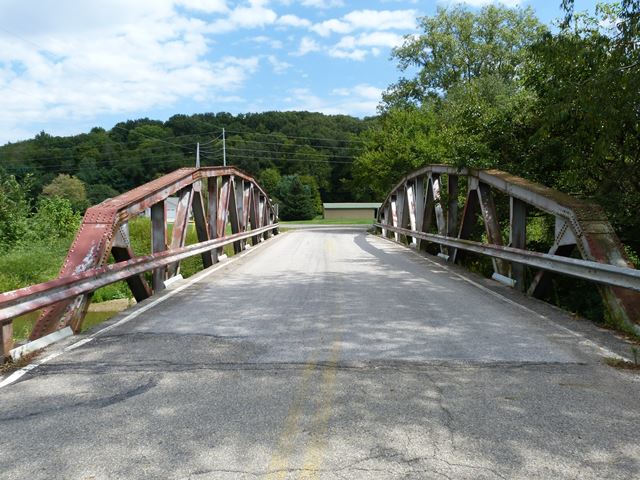We Recommend:
Bach Steel - Experts at historic truss bridge restoration.
BridgeHunter.com Phase 1 is released to the public! - Visit Now
Rocky Fork Road Bridge

Primary Photographer(s): Nathan Holth
Bridge Documented: September 11, 2015
Rural: Licking County, Ohio: United States
1928 By Builder/Contractor: Pittsburgh - Des Moines Steel Company of Pittsburgh, Pennsylvania and Engineer/Design: Ohio State Highway Department
Not Available or Not Applicable
105.0 Feet (32 Meters)
108.0 Feet (32.9 Meters)
24 Feet (7.32 Meters)
1 Main Span(s)
4531221

View Information About HSR Ratings
Bridge Documentation
View Archived National Bridge Inventory Report - Has Additional Details and Evaluation
This bridge was designed by the Ohio state highway department. It has an unusual design of built-up bottom chord that can be found on some other department-designed trusses. This bridge has wide flange beams for some of the truss members. These bear Bethlehem Steel's name. As the inventor of the wide flange beam, for many years these were simply called Bethlehem beams. This is an earlier-than-average use of such beams on truss bridges.
This bridge has a number of bolted repairs.
Information and Findings From Ohio's Historic Bridge InventorySetting/Context The bridge carries a 2 lane road over a stream in a sparsely developed, rural setting. Physical Description The 1 span, 108'-long rivet-connected Warren pony truss has polygonal upper chord and verticals. The members are rolled sections. Summary of Significance "The 1928 Warren pony truss is a representative example of its type/design. It has riveted connections, typical of Warren trusses from about 1910 into the 1950s. It has no innovative or distinctive details, and it is not an early example of its type, design, or construction. It was advanced from reserve pool to select in 1994, presumably due to its documented builder and length, which is at the upper range of pony trusses. In comparison with the statewide population and the context of riveted truss bridge, it is not historically or technologically significant. It is recommended as not eligible. Warren trusses are the most common 20th century truss design found in Ohio and the nation. The Ohio Phase 1A survey (2008) has identified more than 500 examples dating from 1897 to 1961, accounting for well over half of the approximately 800 pre-1961 metal trusses. The Warren design was particularly well suited to rigid (riveted, and later welded connections), but not as well suited to pin connections; this helps to explain its popularity in the 20th century rather than the 19th century, although it is based on a British patent issued to engineers James Warren and Willoughby Monzani in 1848. In the U.S., the popularity of the Warren truss coincided with improvements in pneumatic field riveting equipment starting about 1900. The Warren, which is based on a series of equilateral triangles, is identified by its simplicity of design, ease of construction with equal-sized members, and ability of some diagonals to act in both tensions and compression. Warren trusses are often stiffened by the addition of verticals; they can also have polygonal (sloped) upper chords to achieve greatest depth at midspan. Warren trusses were a standard design of the Ohio State Highway Department in the 1910s and 1920s, but they achieved their greatest popularity with county engineers, who purchased the bridges from Ohio fabricators such as the Champion Bridge Co. and the Mt. Vernon Bridge Co." Bridge Considered Historic By Survey: No |
![]()
Photo Galleries and Videos: Rocky Fork Road Bridge
Bridge Photo-Documentation
Original / Full Size PhotosA collection of overview and detail photos. This gallery offers photos in the highest available resolution and file size in a touch-friendly popup viewer.
Alternatively, Browse Without Using Viewer
![]()
Bridge Photo-Documentation
Mobile Optimized PhotosA collection of overview and detail photos. This gallery features data-friendly, fast-loading photos in a touch-friendly popup viewer.
Alternatively, Browse Without Using Viewer
![]()
Maps and Links: Rocky Fork Road Bridge
Coordinates (Latitude, Longitude):
Search For Additional Bridge Listings:
Bridgehunter.com: View listed bridges within 0.5 miles (0.8 kilometers) of this bridge.
Bridgehunter.com: View listed bridges within 10 miles (16 kilometers) of this bridge.
Additional Maps:
Google Streetview (If Available)
GeoHack (Additional Links and Coordinates)
Apple Maps (Via DuckDuckGo Search)
Apple Maps (Apple devices only)
Android: Open Location In Your Map or GPS App
Flickr Gallery (Find Nearby Photos)
Wikimedia Commons (Find Nearby Photos)
Directions Via Sygic For Android
Directions Via Sygic For iOS and Android Dolphin Browser
USGS National Map (United States Only)
Historical USGS Topo Maps (United States Only)
Historic Aerials (United States Only)
CalTopo Maps (United States Only)

